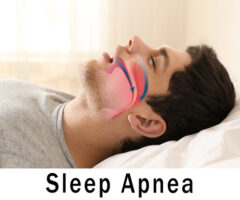The ABCs of Sleep Apnea: Causes, Symptoms, and Treatments

Sleep apnea is a serious sleep disorder that affects millions of people globally. It is a condition characterized by interruptions in breathing during sleep, leading to poor quality sleep and a host of health problems. Sleep apnea can be of two types – obstructive sleep apnea (OSA) and central sleep apnea (CSA). OSA is more common, and it occurs when the muscles at the back of the throat fail to keep the airway open, causing breathing to stop temporarily. CSA, on the other hand, occurs when the brain fails to send the right signals to the muscles responsible for breathing. In this blog post, we will explore the causes, symptoms, and treatments of sleep apnea.
Causes of Sleep Apnea:
Several factors can increase the risk of developing sleep apnea, including:
1. Obesity: Excessive weight is one of the most prevalent risk factors for sleep apnea. The extra fat around the neck can put pressure on the airway, causing it to narrow.
2. Age: Sleep apnea is more common in middle-aged and older adults.
3. Alcohol and sedatives: The intake of sedatives and alcohol can relax the throat muscles, causing the airway to narrow and potentially resulting in disrupted breathing during sleep.
4. Smoking: Smoking irritates the airways and increases inflammation, leading to airflow obstruction.
5. Genetics: Family history of sleep apnea can increase the risk of developing the condition.
Symptoms of Sleep Apnea:
The symptoms of sleep apnea can vary depending on the severity of the condition. Common symptoms of sleep apnea include:
1. Loud and persistent snoring
2. Choking or gasping during sleep
3. Pauses in breathing while sleeping
4. Restless sleep
5. Sleepiness during waking hours
6. Difficulty concentrating, memory problems, and difficulty staying awake during daytime
7. Headaches, particularly in the morning
8. Dry mouth or sore throat upon waking up
9. Insomnia
10. Irritability, depression, and mood swings.
It is essential to see a healthcare professional promptly should you find yourself exhibiting any of the above symptoms.
Treatments for Sleep Apnea:
There are various treatment options for sleep apnea. An appropriate treatment prescribed will depend on the cause, severity, and frequency of the sleep apnea episodes occurring. Let us explore the different treatment options.
1. Lifestyle changes: Making lifestyle changes can help alleviate symptoms of sleep apnea. This includes losing weight, abstaining from alcohol and sedatives, sleeping on your side, and treating allergies or nasal congestion.
2. Continuous Positive Airway Pressure therapy (CPAP): CPAP is the most common treatment for sleep apnea. The therapy involves wearing a mask over the nose and/or mouth while sleeping. The mask is connected to a machine that provides continuous pressurized air, keeping the airway open during sleep.
3. Bi-level Positive Airway Pressure therapy (BiPAP): BiPAP is similar to CPAP in that it delivers pressurized air to keep the airway open during sleep. However, the BiPAP machine adjusts the pressure during each breath, providing more pressure during inhalation and less during exhalation.
4. Oral appliances: Oral appliances are custom-fitted devices that are worn in the mouth during sleep. They help keep the airway open by repositioning the jaw, tongue, and soft palate.
5. Surgery: Surgery to treat sleep apnea is typically reserved for severe cases that do not respond to other treatments. Surgical procedures may include removing excess tissue from the throat, reconstruction of the jawbone, or implanting a device that stimulates the airway muscles.
Final Thoughts
Sleep apnea is a highly prevalent sleep disorder that greatly affects an individual’s quality of life if left untreated. It is vital to seek medical advice from a board-certified cardiologist when you exhibit symptoms of sleep apnea. Depending on the cause, severity, and frequency of sleep apnea, treatment options can range from lifestyle changes to surgical procedures. Lifestyle changes such as weight loss, abstaining from alcohol or sedatives, and sleeping on your side can alleviate symptoms of sleep apnea. However, moderate to severe cases of sleep apnea require more intensive medical intervention, such as CPAP/BiPAP therapy, oral appliances, and possibly, surgery. Therefore, with sleep apnea, early detection and appropriate treatment can considerably improve affected individuals’ quality of life in the long run.


